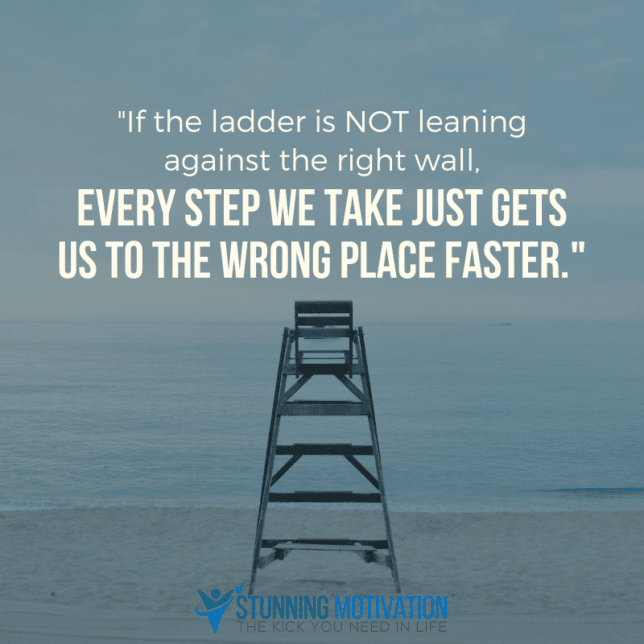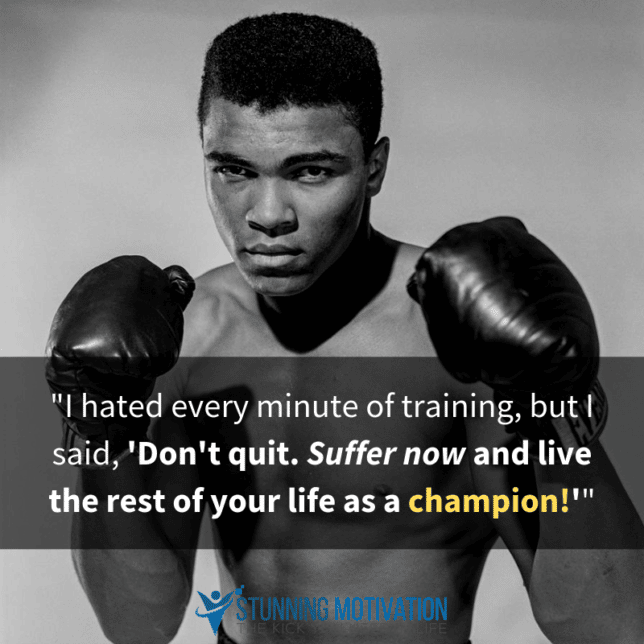What? Setting goals can be bad? Are you serious? In short, yes, there is a huge problem with goal setting and if you don’t know what you’re doing, it can give you the negative effect in achieving the success you want in life.
We all heard about goal setting and we set goals in order to achieve the results we desire in life. But the problem is that goal setting can be dangerous if you do it in the wrong way.
When you don’t know how to do it or what you’re doing, you’ll set yourself up for failure.
As what Stephen R. Covey famously said:

“If the ladder is NOT leaning against the right wall, every step we take just gets us to the wrong place faster.”
I bet you don’t want that to happen. You want to make sure you’re running in the right direction so that you can run as fast as possible to get to the right destination.
If you run in the wrong direction, guess what, no matter how fast you run, you will never arrive at your destination. Instead, you will get to the wrong place, only faster.
Hence, stop for a moment and think about if you’re setting the right goals in the right manner. If you don’t, continue to read on because I’m going to explain to you how you can make things right…
Why Goal Setting Can Be Dangerous
Here’s what you need to know about setting goals – your goals allow you to focus on the results, not the progress.
And there is good and bad on this. Here’s what James Clear, the New York Times best-selling author of Atomic Habits has to say:
As you know, I publish a new article every Monday and Thursday. Since my first article on November 12, 2012, I’ve never missed a scheduled date. Sometimes the article is shorter than expected, sometimes it’s not as compelling as I had hoped, and sometimes it’s not as useful as it could be … but it gets out to the world and into your inbox.
The results of this simple schedule have been amazing. Our little community has grown, seemingly without effort. We now have over 1,100 people (welcome friends!) who are committed to living a healthy life and who are actively supporting one another. Onwards to 5,000 strong!
Imagine if I had set a deadline for myself instead, like “get 1,000 subscribers in 12 weeks.” There’s no way I would have written every Monday and Thursday and if I didn’t reach my goal, then I would have felt like a failure.
And James was right. If he was to focus on the goal, he would never commit and put his effort into writing and publishing articles twice a week.
The same thing happens if you want to lose weight and all you do is you focus on the gauge on the weighing machine.
In the first few days or weeks, guess what most people will do? Every day, they will weigh themselves. There is really nothing wrong with measuring the result, but you have to understand that measuring your result is not going to help you get the outcome that you want.
What you need to do then, is to measure and track your progress.
Instead of weighing yourself every day, choose to track and measure your progress. Track how many hours you spend in the gym. Measure how many sessions of lifts, sit-ups, or how many minutes you put into running.
You want to measure your progress, not your results.
When you measure your results, like if you weigh yourself every day, and if you don’t see any significant changes on the weighing machine, you will feel dejected and lose your motivation.
This is what happens to most people and this is why most people fail at their goals.
And this is why goal setting can be dangerous if you don’t know what you’re doing.
Follow the Right Method to Set Goals
What you need to do then is to follow the right method to set goals. Now, I’m going to be honest here, goal setting works, and I strongly suggest everyone set goals.
However, there are other things you need to do to move the results. In other words, you can’t just set goals and focus on your goals. This process alone is NOT enough.
If you write down your goals, look at them every day, highly likely, by the end of the day, you’re going to fail at your goals.
You want to set goals and at the same time, create a system to track your progress. You want to know your progress so that you can work on it and produce the results you want.
Take this blog as an example. If my goal for this blog is to build 50,000 email subscribers, guess what I will do?
For instance, I will check the number of subscribers, traffic, and the amount of money I make every day. Why? Because my goal is to focus on the number of subscribers.
And yes, I may write and publish a few articles here and there, and I will also share my articles on social media. But after a while if I see that I only have 100 email subscribers, I will feel lost and feel like what I’m doing is not working.
Therefore, instead of focusing on the result, you must focus on the progress. For example, my progress to reach my goal of growing an email list of 50,000 people can be something like, “consistently publishing quality content on my blog every Tuesday and Thursday”, which I did since day one.
And guess what, now that I know my progress, and all I need to do is to focus and carry out the plan.
After a year of consistent publishing quality articles every Tuesday and Thursday, do you think I’m able to reach my goal of getting 50,000 email subscribers? The chance is definitely higher.
This is why you need to focus on the progress, not the results.
Now that you know the problem with goal setting, here are 3 suggestions you can follow:
1. Act on the Lead Measures
First, act on the lead measures. Lead measures are measures that you can work on which will directly influence the results you want.
For example, when it comes to losing weight, losing X number of pounds or KGs is not a lead measure, it is a lag measure.
A lead measure is something like exercising for X amount of hours each week.
The problem with most people is that they focus on the lag measure instead of the lead measure. Here’s another example:
- Lag measure: to increase sales this month.
- Lead measure: to call and make appointments with prospects.
If you look at the above example, you will notice that you cannot execute on the lag measure, but you can work on the lead measure. Plus, the lag measure is the final result you desire. Whereas the lead measure is the execution that you can act on to produce the result you desire, which is to increase sales.
Do you get that?
Stop focusing on the lag measure and start focusing on your lead measure. For every goal you set, you need to identify the lead measures so that you can work on them.
For example, if your goal is to build a successful blog or to grow your email list, these are lag measures. They are the results you desire, but not something you can work on.
What are the lead measures then? The lead measures can be something like, to write and publish content every day on the blog, to create a video and upload it to YouTube once a week, and to leverage on Pinterest by submitting 10 pins every day.
If you do the above lead measure, you will eventually produce the results you want, and achieve your goal of building a successful blog.
I hope by now you understand the power of working on your lead measures rather than your lag measures.
If you want to learn more about lead and lag measures, read this book, The 4 Disciplines of Execution.
2. Fall in Love with the Game Plan
You should know that in order to win at any game and to achieve your goals, you need to have a system to create the result you want, right?
If you want to lose weight, the system or the game plan is exercise and the number of calories you take in each day.
If you’re in sales and your goal is to increase your sales number, your game plan should be something like the number of prospects you are talking to each day, how many sales presentation you did in a week, or how many appointments you have with your clients.
If you want to build a successful blog and make money from it, your game plan should be the articles you publish on your blog, how many social shares and links you have pointing back to your articles, or your plan to market and syndicate your blog’s content.
Now, I know you want to achieve your goals, everyone does, but what separates those who achieved their goals and those who failed, are the ones that fall in love with their game plan.
In other words, you must make your progress a habit. You must have a passion for your progress.
Why? The reason is simple – success is not a one-time action, but continuous progress that leads you to the outcome you want.
It is not what you do once in a while that determine your success. It is what you do day-in and day-out that will get you the results you want.
Plus, success usually will not come to you in a matter of days or weeks. It takes years to produce extraordinary success in life. Hence, you must fall in love with progress.
Successful people face a tough situation and tell themselves that they need to do it and they did. On the other hand, unsuccessful people face the same tough situation and choose to give up or do something else.

“I hated every minute of training, but I said, ‘Don’t quit. Suffer now and live the rest of your life as a champion!'”
3. Track Your Progress
Don’t just write down your goals and then forget about them. What you can do is to track your progress.
Goal setting is not something that you do once and then forget about it. It is something you need to do every day.
In my opinion, setting your goals and achieving them is a skill. And like any other skills, you can train yourself to get good at it. Yes, you can become good at setting and achieving your goals.
But first, learn to track your progress. Read my previous article:
How to Track Your Goals: The 5 Fabulous Ways You Should Consider
Tracking and measuring are important because you want to know where you are and find out if what you do is getting you the results you desire.
Plus, when you track, measure, or even review your goals, you become more aligned with your goals. You make your goals ‘alive’ by doing something about them.
Therefore, track your progress, know where you are, know your performance, and so then you can improve every day. You can only move forward when you know you are making progress.
If you don’t measure your progress, there’s no way you can tell if you are moving forward, or moving backward.
What You Can Do Now:
Don’t just set goals blindly, you need to understand the process of achievement. Hence, learn as much as you can about setting and achieving your goals.
Improve yourself daily. Read. Do something to make progress every day. Act on your lead measure. Create a system to track your progress, and more importantly, fall in love with your goals and progress.
Shawn is a passionate coach who empowers individuals to achieve their goals and reach new heights of success. With his experience in the personal development industry, Shawn has guided countless people towards fulfilling their potential and achieving outstanding results in life. He has experience in the personal development industry for more than 7 years and has helped countless success seekers to achieve outstanding success in life. Learn more about him on Everydaypower.com or Goalcast.com






















